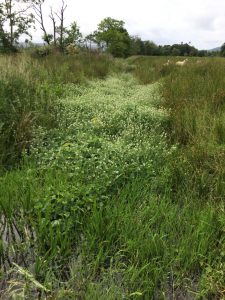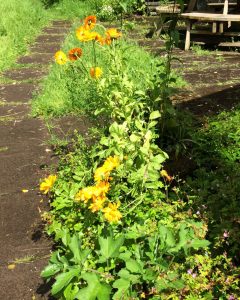
This is the river running through Kilmartin Glen, which we visited during the Expressing the Earth conference at the weekend. I am hoping to have some longer, more considered posts drawing out some of the themes of the experience, but this will have to wait until I’ve collected my thoughts – it was a very rich and full programme, and will take some digesting!
- the thunderstorm which happened just after I arrived, taking out the WIFI at Seil Island Hall. It made it impossible to tweet, stream events or even to run the films we had planned, but there was enough going on without that!
- meeting old friends, some familiar figures from previous geopoetic events, some from the poetry world, and some known only from Facebook up to now – and the making of many new ones.
- the beautiful island setting, and the wonderful catering provided by a local firm Fisherman’s Kitchen.
- Siobhan Healy’s glass ghost orchids
- Luke Devlin talking about ‘radical geopoetics’, and everyone delightedly waking up to what he meant.
- how receptive people were to my talk about herbs and to the Charm leaflet. And I sold some books!
- the cyanotypes people made at Susannah Rosenfeld-Kings workshop.
- hearing lots of other languages spoken – German, Gaelic, Spanish, Portuguese – and accents from all kinds of places
- Alistair McIntosh being the voice of a stone, and talking about the community buyout of Eigg
- Neil Simco’s keynote about the educational vision of UHI, plus Mairead Nic Craith about identity and relationship, and Anuschka Miller turning our ideas about ocean on their heads.
- the lovely herb garden at Kilmartin, designed by story-teller Patsy Dyer, and maintained by her wonderful crew of volunteers.
- the baby robins outside the museum, barely fledged and playing around the benches under the watchful eye of their parent, each staking a claim to its own bench.
- Dreaming Agrakas, an opera written by Mark Sheridan moving between the coasts of Scotland Greece and Sicily, combining references to traditional Gaelic music and coastal folklore, a classical Greek ode by Pindar and a modern reflection on the many migrants drowned in the Mediterranean. There were only three performers, Hannah Bown, voice, Morag Currie, violin and Mark himself on piano, but it was a magnificent achievement.
- hearing Nikita Pfister’s river suite, beautifully played on the melodeon, and Dave Francis, long known to me for his generosity as a teacher and developer of traditional music, singing himself.

